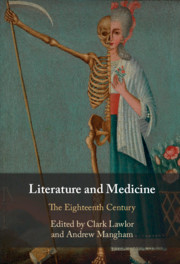Book contents
- Literature and Medicine
- Literature and Medicine
- Copyright page
- Contents
- Figures
- Contributors
- Acknowledgements
- Introduction
- Part I Literary Modes
- Chapter 1 ‘Mere Flesh and Blood’
- Chapter 2 Jane Barker, Medical Discourse, and the Origins of the Novel
- Chapter 3 Imaginary Invalids
- Part II Psyche and Soma
- Part III Professional Identity and Culture
- Index
Chapter 1 - ‘Mere Flesh and Blood’
Poetry, Genre, and Medicine
from Part I - Literary Modes
Published online by Cambridge University Press: 03 June 2021
- Literature and Medicine
- Literature and Medicine
- Copyright page
- Contents
- Figures
- Contributors
- Acknowledgements
- Introduction
- Part I Literary Modes
- Chapter 1 ‘Mere Flesh and Blood’
- Chapter 2 Jane Barker, Medical Discourse, and the Origins of the Novel
- Chapter 3 Imaginary Invalids
- Part II Psyche and Soma
- Part III Professional Identity and Culture
- Index
Summary
This essay aims to show that medicine had a deep and dynamic relationship with poetry in the eighteenth century and the Romantic period. It uses Dr John Arbuthnot’s poetry to demonstrate how profoundly medical theories affected the idea of the human, and goes on analyse Alexander Pope’s ‘Cave of Spleen’ in The Rape of the Lock to demonstrate the complex effects medical theories and other discourses, including folklore and religion, create in a canonical, and highly gendered, poem of the early period. The essay describes the main medical theories of this ‘long’ century (humouralism, mechanism and (al)chemistry, the nerves and sensibility, vitalism and Brunonianism) and their uneven evolution, and analyses their effects on a variety of poets, including Anne Finch, Mark Akenside, Hannah More, Charlotte Smith, and Percy Shelley. It also focuses on the ‘regimen’ poetry of physician-poets Edward Baynard and John Armstrong, arguing that all kinds of discourses are bound up with both poetry and medicine, and that poetry, even of the didactic kind, is not reducible to medical discourse, and is capable of intervening in and shaping medical debates and medical knowledge.
Keywords
- Type
- Chapter
- Information
- Literature and MedicineThe Eighteenth Century, pp. 23 - 50Publisher: Cambridge University PressPrint publication year: 2021

